Related Research Articles
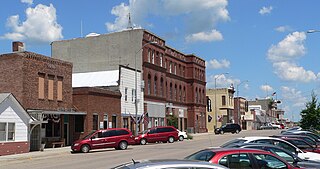
Pender is a village in Thurston County, Nebraska, United States. On March 22, 2016, the United States Supreme Court resolved a disagreement as to whether Pender is located on the Omaha Indian Reservation, holding unanimously that "the disputed land is within the reservation’s boundaries." The predominantly European-American population was 1,115 at the 2020 census.

The Pine Ridge Indian Reservation, also called Pine Ridge Agency, is an Oglala Lakota Indian reservation located entirely within the U.S. state of South Dakota. Originally included within the territory of the Great Sioux Reservation, Pine Ridge was created by the Act of March 2, 1889, 25 Stat. 888. in the southwest corner of South Dakota on the Nebraska border. Today it consists of 3,468.85 sq mi (8,984 km2) of land area and is one of the largest reservations in the United States.

Whiteclay is an unincorporated community and census-designated place in Sheridan County, Nebraska, United States. The population was 10 at the 2010 census.
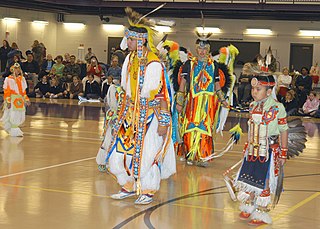
The Ho-Chunk, also known as Hoocągra or Winnebago, are a Siouan-speaking Native American people whose historic territory includes parts of Wisconsin, Minnesota, Iowa, and Illinois. Today, Ho-Chunk people are enrolled in two federally recognized tribes, the Ho-Chunk Nation of Wisconsin and the Winnebago Tribe of Nebraska.
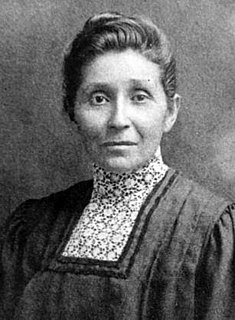
Susan La Flesche Picotte was a Native American doctor and reformer in the late 19th century. She is widely acknowledged as one of the first Indigenous peoples, and the first Indigenous woman, to earn a medical degree. She campaigned for public health and for the formal, legal allotment of land to members of the Omaha tribe.
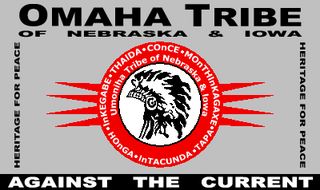
The Omaha are a federally recognized Midwestern Native American tribe who reside on the Omaha Reservation in northeastern Nebraska and western Iowa, United States. There were 5,427 enrolled members as of 2012. The Omaha Reservation lies primarily in the southern part of Thurston County and northeastern Cuming County, Nebraska, but small parts extend into the northeast corner of Burt County and across the Missouri River into Monona County, Iowa. Its total land area is 307.03 sq mi (795.2 km2) and the reservation population, including non-Native residents, was 4,526 in the 2020 census. Its largest community is Macy.

Alice Cunningham Fletcher was an American ethnologist, anthropologist, and social scientist who studied and documented American Indian culture.

Raymond Carlos Nakai is a Native American flutist of Navajo and Ute heritage. Nakai played brass instruments in high school and college, and auditioned for the Armed Forces School of Music after a two-year period in the United States Navy. He began playing a traditional Native American cedar flute after an accident left him unable to play the trumpet. Largely self-taught, he released his first album Changes in 1983, and afterward signed a contract with Canyon Records, who produced more than thirty of his albums in subsequent years. His music prominently features original compositions for the flute inspired by traditional Native American melodies. Nakai has collaborated with musicians William Eaton, Peter Kater, Philip Glass, Nawang Khechog, Paul Horn, and Keola Beamer. He has received 11 Grammy Award nominations for his albums.
Nebraskans For Peace, or NFP, is a peace advocacy organization based in Lincoln, Nebraska, United States. "Nebraskans for Peace is a statewide grassroots advocacy organization working nonviolently for peace with justice through community building, education and political action."

Francis La Flesche was the first professional Native American ethnologist; he worked with the Smithsonian Institution. He specialized in Omaha and Osage cultures. Working closely as a translator and researcher with the anthropologist Alice C. Fletcher, La Flesche wrote several articles and a book on the Omaha, plus more numerous works on the Osage. He made valuable original recordings of their traditional songs and chants. Beginning in 1908, he collaborated with American composer Charles Wakefield Cadman to develop an opera, Da O Ma (1912), based on his stories of Omaha life, but it was never produced. A collection of La Flesche's stories was published posthumously in 1998.

Susette La Flesche, later Susette LaFlesche Tibbles and also called Inshata Theumba, meaning "Bright Eyes" (1854–1903), was a well-known Native American writer, lecturer, interpreter, and artist of the Omaha tribe in Nebraska. La Flesche was a progressive who was a spokesperson for Native American rights. She was of Ponca, Iowa, French, and Anglo-American ancestry. In 1983, she was inducted into the Nebraska Hall of Fame. In 1994, she was inducted into the National Women's Hall of Fame.
Cecilia Fire Thunder is a nurse, community health planner and tribal leader of the Oglala Sioux. On November 2, 2004, she was the first woman elected as president of the Tribe. She served until being impeached on June 29, 2006, several months short of the two-year term. The major controversy was over her effort to build a Planned Parenthood clinic on the reservation after the South Dakota legislature banned most abortions throughout the state. The tribal council impeached her for proceeding without gaining their consensus.
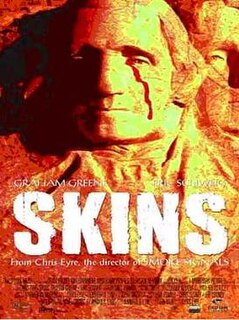
Skins is a 2002 American feature film by Chris Eyre and based upon the novel of the same name by Adrian C. Louis. The film is set on the fictional Beaver Creek Indian Reservation in South Dakota near the Nebraska border, a place very much like the actual Pine Ridge Indian Reservation, the setting in the book and the place where the film was actually shot. Lakota Sioux tribal police officer Rudy Yellow Lodge struggles to rescue his older, alcoholic brother, Mogie, a former football star who was wounded in combat three times in Vietnam. Winona LaDuke makes a cameo appearance as Rose Two Buffalo.

Native American tribes in the U.S. state of Nebraska have been Plains Indians, descendants of succeeding cultures of indigenous peoples who have occupied the area for thousands of years. More than 15 historic tribes have been identified as having lived in, hunted in, or otherwise occupied territory within the current state boundaries.

The Omaha Reservation of the federally recognized Omaha tribe is located mostly in Thurston County, Nebraska, with sections in neighboring Cuming and Burt counties, in addition to Monona County in Iowa. As of the 2020 federal census, the reservation population was 4,526. The tribal seat of government is in Macy. The villages of Rosalie, Pender and Walthill are located within reservation boundaries, as is the northernmost part of Bancroft. Due to land sales in the area since the reservation was established, Pender has disputed tribal jurisdiction over it, to which the Supreme Court ruled unanimously in 2016 that "the disputed land is within the reservation’s boundaries."

The Winnebago Reservation of the Winnebago Tribe of Nebraska is located in Thurston County, Nebraska, United States. The tribal council offices are located in the town of Winnebago. The villages of Emerson, south of First Street, as well as Thurston, are also located on the reservation. The reservation occupies northern Thurston County, Nebraska, as well as southeastern Dixon County and Woodbury County, Iowa, and a small plot of off-reservation land of southern Craig Township in Burt County, Nebraska. The other federally recognized Winnebago tribe is the Ho-Chunk Nation of Wisconsin.
Franklin Dean LaMere was an American activist and politician. He was a member of the Winnebago Tribe of Nebraska from South Sioux City, and the son of a Gold Star Mother and a combat veteran father. He was a member of the American Indian Movement (AIM) in the 1970s and was noted for his work opposing liquor sales in Whiteclay, Nebraska, a small town whose main industry is selling alcohol to residents of the nearby Pine Ridge Indian Reservation, where alcohol sales are prohibited. LaMere was a leader in the Democratic Party, and served as chairman of the National Native American Caucus. He was a delegate to the Democratic National Convention seven consecutive times from 1988 to 2012.

On a Knife Edge is a 2017 American documentary film directed by Jeremy Williams and produced by Eli Cane. The film premiered at the 2017 SF Doc Festival, and broadcast nationally on the PBS World show America ReFramed on November 7, 2017.
Tom Brewer is an American politician serving as a member of the Nebraska Legislature from the 43rd district. Elected in 2016, he assumed office in 2017.
Bryan V. Brewer was president of the Oglala Sioux Tribe from 2012 to 2014.
References
- ↑ Schuller, Lisa Local Catholics use Music to Praise, Inspire, The Catholic Voice, Omaha, Nebraska (October 25, 2002)
- ↑ Murphy's history with the flute and his heritage are discussed in: "Folk flutes encourage understanding". Beatrice Daily Sun. August 4, 2014. Retrieved June 13, 2016. and: "Learn about the Native American flute from Michael Murphy". Omaha Creative Institute. 2010. Retrieved August 19, 2011.
- ↑ Vogel, Brandon (2010). "Concert aims to pressure state to take responsibility, change ugly story". The Reader. Retrieved August 19, 2011.
- ↑ Vasina, Mark (2010). "The Battle for Whiteclay". The Reader. Retrieved August 19, 2011.
- ↑ "Folk flutes encourage understanding". Beatrice Daily Sun. August 4, 2014. Retrieved June 13, 2016.
- ↑ Kevin Abourezk (December 11, 2015). "Activist hopes Whiteclay song can elevate discussion". Lincoln Journal Star. Retrieved June 13, 2016.
- ↑ "Encounter Center showcases songs, prayers". Sioux City Journal. 2011. Retrieved August 19, 2011.
- ↑ Kerri Rempp (May 24, 2016). "FTD announces Siebert appearance". Chadron Record. Retrieved June 13, 2016.
- ↑ Emily Hemphill (August 27, 2014). "The Red Tails have arrived". Beatrice Daily Sun. Retrieved June 13, 2016.